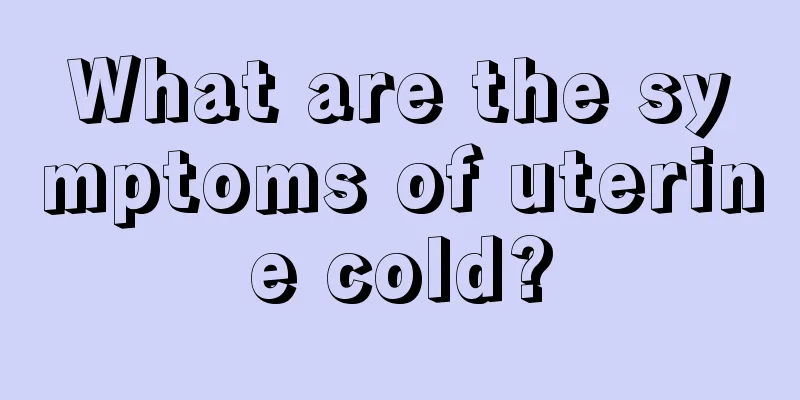Ovulation bleeding has an odor

|
Every female friend may encounter the symptom of ovulation bleeding with odor. It is a pathological symptom of ovulation, mainly because of the odor caused by inflammatory infection, so you should have a leucorrhea examination. If female friends have bleeding with odor during ovulation, it is very likely that they have menstrual irregularities and cervical erosion and other diseases. You should seek thorough treatment, otherwise it will endanger your health. What is the cause of ovulation bleeding with odor? Ovulation bleeding is a common symptom for women during ovulation, but if there is an odor, it may be an inflammatory infection. It is recommended that women who experience ovulation bleeding accompanied by odor go to the hospital for routine leucorrhea and B-ultrasound examinations to determine whether they have inflammation. Ovulation bleeding may be a sign of many reproductive tract diseases, such as irregular menstruation, cervical erosion, cervical polyps, cervical cancer, endometrial polyps, submucous uterine fibroids, endometrial adenocarcinoma and other reproductive tract diseases, which can cause ovulation bleeding symptoms. If the primary disease that causes ovulation bleeding is not treated promptly and thoroughly, it may endanger women's health. In addition, patients with ovulation bleeding often have abdominal pain symptoms and periodic intermenstrual pain, which generally lasts for several hours and may last longer in some patients. What to do if ovulation bleeding has an odor Ovulation bleeding, also known as "intermenstrual bleeding", is caused by a temporary drop in estrogen levels, which causes the endometrium to lose hormonal support and partially shed, resulting in regular vaginal bleeding. The amount of bleeding is not much. Some people only have a small amount of brown discharge, which usually lasts for half a day or 2-3 days, and no more than 7 days at most. It may be accompanied by mild ovulation pain and backache. It is recommended to check endocrine for endocrine disorders. Most women have brown discharge as their menstrual cycle changes. It will disappear spontaneously if it stabilizes. If it recurs or there is a lot of bleeding, you can go to the hospital for treatment. The clinical manifestations of ovulation bleeding are as follows: 1. Uterine bleeding. During the menstrual cycle with ovulation, ovulation uterine bleeding occurs. The amount of bleeding is small, and some are only brown secretions. It usually stops on its own in 2-3 days, and the longest time is 7 days. 2. Abdominal pain. Cyclic intermenstrual pain can be mild or severe and usually lasts for several hours, but in some patients it may last for 2-3 days. 3. Infertility. It may be caused by stopping sexual life due to ovulation bleeding, thus missing the opportunity of conception. Note: Generally there are no obvious positive signs. The diagnosis can be confirmed by diagnostic curettage, basal body temperature measurement (basal body temperature is biphasic, and bleeding occurs when low and high temperatures change), and laparoscopy. If the symptoms are mild, no treatment is needed. If the bleeding is heavy or affects fertility, medication can be used for treatment. |
<<: Bleeding three days after ovulation
>>: Acne on both sides of cheeks during pregnancy
Recommend
Signs that a girl's height has stopped growing
When girls reach maturity, they will generally gr...
What delicacies can be made with dried mango? Can dried mango be stored in the refrigerator?
The taste of dried mango is sweet and sour, but n...
What ointment is good for vaginal pain
When a woman has pain in her genitals, do not ign...
Can I eat crabs after having an abortion?
For women, having an abortion is the same as givi...
Which is better, breast conservation or radical resection?
Many people are very afraid of cancer. In fact, s...
I had sex after having the IUD for a week.
You must be aware of some precautions after havin...
Qi An Xin: There are more than 2,650 DeepSeek knockoff websites, 60% of which are from the United States
Although the United States has enacted a special ...
Is it true that postpartum sickness and confinement care are necessary?
There is some truth in treating postpartum diseas...
What do contractions feel like before labor?
Pregnant women will have uterine contractions bef...
Anovulatory functional uterine bleeding is common in
Anovulatory functional uterine bleeding is common...
What vegetables can you eat while breastfeeding?
Breast milk is the best food for newborn babies. ...
What should I do if there is a small hard pimple on the vulva?
Health has been an issue that people have paid mu...
How to cure bacterial vaginitis
When women suffer from bacterial vaginitis, they ...
What causes vulvar swelling and pain?
Some women may experience swelling and pain in th...
Belly jumps in early pregnancy
Pregnant mothers will judge the baby's health...









